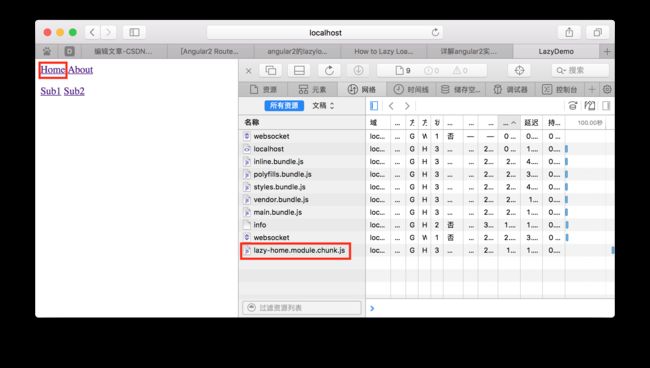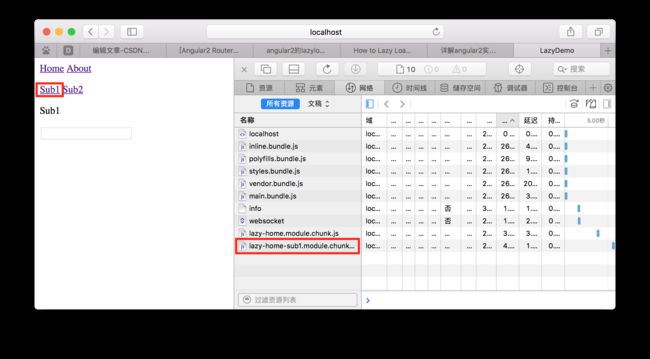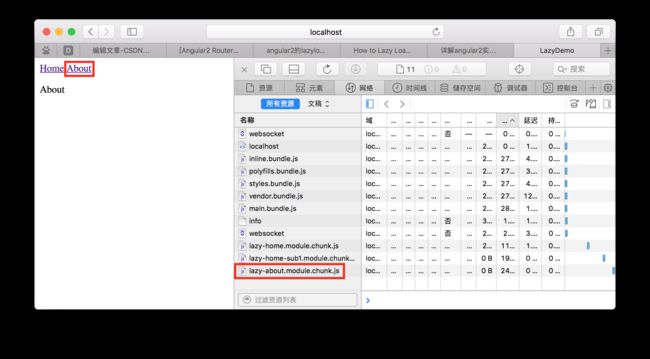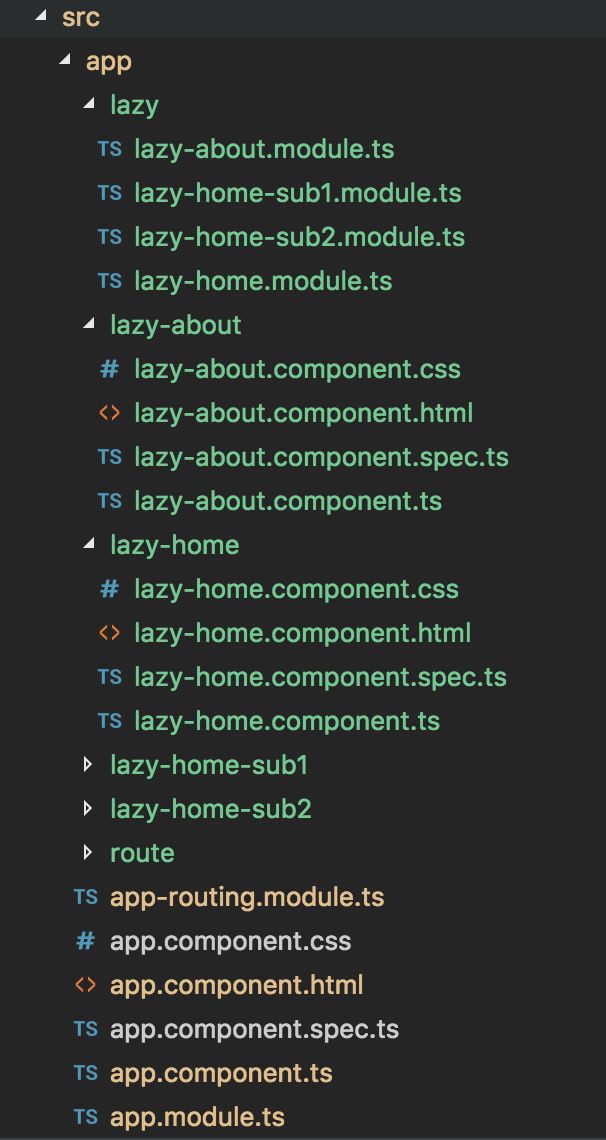Angular Router Lazy Loading
1. 概述
Angular Router 的懒加载是 Angular2 的一项核心特性。懒加载使我们的程序拥有更快的启动速度,因为它在初始加载的时候只需要加载主模块中的内容。当切换到不同路由中时,才去加载路由中定义的相关模块。
本文通过 Tab 之间切换这一个简单的例子来说明 Angular Router 的懒加载。一级 Tab 有 `Home` 和 `About`,在 `Home` 下又有二级 Tab, `Sub1` 和 `Sub2`。
想要实现的效果:当点击 `Home` 的时候,去加载 `Home` Tab 所需要的文件;当点击 `Home` 下的子 Tab,`Sub1` 的时候,才去加载 `Sub1` Tab 所需文件;当点击 `About` 的时候,才去加载 `About` Tab 所需要的文件。即当进入某路由的时候,才去加载该路由所需要的文件,而不是一上来就加载全部,从而使程序拥有更快的启动速度。
程序目录如下:
2. 代码
下面直接上代码
APP:
<
a
routerLinkActive=
"active"
routerLink=
"/lazy-home"
>Home
a
>
<
a
routerLinkActive=
"active"
routerLink=
"/lazy-about/about"
>About
a
>
<
router-outlet
>
router-outlet
>
// app-routing.module.ts
import { NgModule } from '@angular/core';
import { Routes, RouterModule } from '@angular/router';
import { Route } from '@angular/router/src/config';
const routes: Routes = [
{
path: '',
children: [
{
path: 'lazy-home',
loadChildren: './lazy/lazy-home.module#LazyHomeModule'
},
{
path: 'lazy-about',
loadChildren: './lazy/lazy-about.module#LazyAboutModule'
}
// 这里用 `loadChildren` 来代替 `component`。
// `component` 会直接加载组件,如果想实现懒加载的话,就需要用 `loadChildren`,
// 然后在 `loadChildren` 里写明该组件的模块所在的路径。
]
}
];
@NgModule({
imports: [RouterModule.forRoot(routes)],
exports: [RouterModule]
})
export class AppRoutingModule { }
// app.module.ts
import { BrowserModule } from '@angular/platform-browser';
import { NgModule } from '@angular/core';
import { AppRoutingModule } from './app-routing.module';
import { AppComponent } from './app.component';
import { SimpleReuseStrategy } from './route/SimpleReuseStrategy';
import { RouteReuseStrategy } from '@angular/router';
@NgModule({
declarations: [
AppComponent
],
imports: [
BrowserModule,
AppRoutingModule
],
bootstrap: [AppComponent]
})
export class AppModule { }
Home:
// lazy-home.module.ts
import { NgModule } from '@angular/core';
import { CommonModule } from '@angular/common';
import { LazyHomeComponent } from '../lazy-home/lazy-home.component';
import { Routes, RouterModule } from '@angular/router';
import { Router } from '@angular/router/src/router';
const routes: Routes = [
{
path: '',
component: LazyHomeComponent,
children:[
{
path:'home-sub1',
loadChildren:'./lazy-home-sub1.module#LazyHomeSub1Module'
},
{
path:'home-sub2',
loadChildren:'./lazy-home-sub2.module#LazyHomeSub2Module'
}
]
}
];
@NgModule({
imports: [
CommonModule,
RouterModule.forChild(routes)
],
declarations: [LazyHomeComponent]
})
export class LazyHomeModule { }
<p>
<a routerLinkActive="active" routerLink="/lazy-home/home-sub1/sub1">Sub1a>
<a routerLinkActive="active" routerLink="/lazy-home/home-sub2/sub2">Sub2a>
<router-outlet>router-outlet>
p>
Home - Sub1:
// lazy-home-sub1.module.ts
import { NgModule } from '@angular/core';
import { CommonModule } from '@angular/common';
import { Routes, RouterModule } from '@angular/router';
import { LazyHomeSub1Component } from '../lazy-home-sub1/lazy-home-sub1.component';
const routes: Routes = [
{ path: 'sub1', component: LazyHomeSub1Component }
];
@NgModule({
imports: [
CommonModule,
RouterModule.forChild(routes)
],
declarations: [LazyHomeSub1Component]
})
export class LazyHomeSub1Module { }
<p>
Sub1
p>
<input type="text"/>
Home - Sub2:
// lazy-home-sub2.module.ts
import { NgModule } from '@angular/core';
import { CommonModule } from '@angular/common';
import { Routes, RouterModule } from '@angular/router';
import { LazyHomeSub2Component } from '../lazy-home-sub2/lazy-home-sub2.component';
const routes: Routes = [
{ path: 'sub2', component: LazyHomeSub2Component }
];
@NgModule({
imports: [
CommonModule,
RouterModule.forChild(routes)
],
declarations: [LazyHomeSub2Component]
})
export class LazyHomeSub2Module { }
<p>
Sub2
p>
About:
// lazy-about.module.ts
import { NgModule } from '@angular/core';
import { CommonModule } from '@angular/common';
import { LazyAboutComponent } from '../lazy-about/lazy-about.component';
import { Routes, RouterModule } from '@angular/router';
const routes: Routes = [
{ path: 'about', component: LazyAboutComponent }
];
@NgModule({
imports: [
CommonModule,
RouterModule.forChild(routes)
],
declarations: [LazyAboutComponent]
})
export class LazyAboutModule { }
<p>
About
p>
3. 参考网址:
http://www.cnblogs.com/Answer1215/p/5906995.html
http://blog.csdn.net/liangxw1/article/details/78468432?locationNum=5&fps=1
http://www.jb51.net/article/109406.htm



